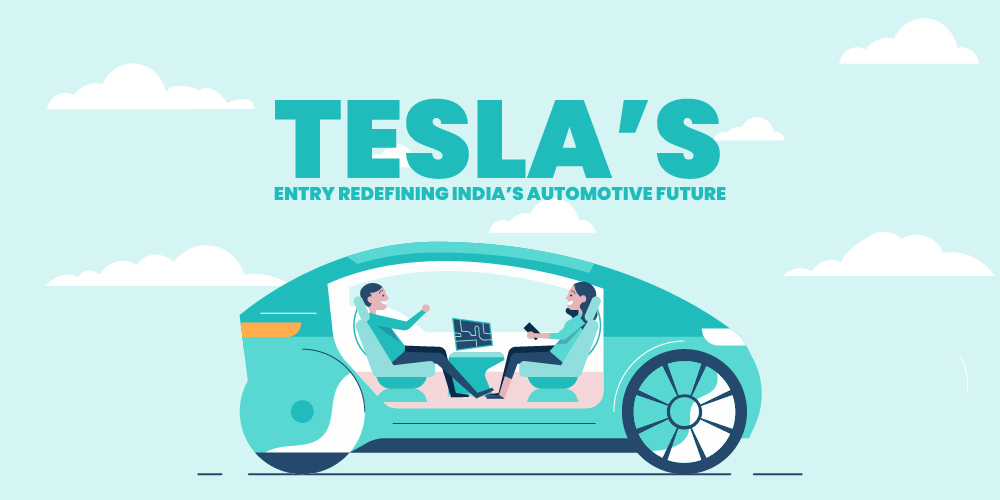Tesla’s Entry Redefining India’s Automotive Future
Introduction
In 2024, the global electric vehicle (EV) market is expected to generate approximately US$623.3 billion in revenue, with projections indicating a steady annual growth rate of 9.82% from 2024 to 2028. This growth trajectory is set to propel the market to an estimated US$906.7 billion by 2028, during which 17.07 million electric vehicles are anticipated to be sold, with an average price of US$52.9k per vehicle in 2024. In India, the electric vehicle market is poised for a remarkable expansion, with sales projected to reach around 27.2 million units by 2032, reflecting a robust annual growth rate of 35% from 2023 to 2032 under normal conditions.
India's electric vehicle sales nearly doubled in 2023, driven by increasing consumer demand, supportive government policies, enhanced charging infrastructure, and growing environmental awareness. For 2024, EV sales are expected to surge by 66%, accounting for 4% of all passenger vehicle sales. This growth is anticipated due to the entry of new market players and the continuation of government subsidies.
The Indian automotive landscape is undergoing a profound transformation, with a significant shift towards electric vehicles and sustainable transportation. As the global focus shifts towards renewable energy and environmental sustainability, international EV manufacturers are increasingly eyeing the vast potential of the Indian market. Among them, Tesla, the trailblazing electric car manufacturer from the United States, has captured the imagination of Indian consumers, signaling a new era of automotive innovation in the country.
Overview of Tesla's Entry to India
Tesla, the innovative electric vehicle manufacturer founded by the visionary Elon Musk, is setting its sights on the expansive Indian market. This American company is renowned for designing, building, and selling fully electric cars, energy storage systems, and solar panels.
Tesla operates primarily in two sectors: Automotive and Energy Generation and Storage. The Automotive division focuses on producing and selling electric vehicles, while the Energy Generation and Storage division is dedicated to developing and marketing home and commercial energy storage products, solar energy systems, and even the electricity generated by these solar installations.
In the first quarter of 2024, Tesla reported sales of $476 million, a decrease from $564 million in the same quarter the previous year. The company's total revenue for the period was $21.3 billion, down from $23.3 billion a year earlier. Tesla's net profit stood at $1.1 billion, significantly lower than the $2.5 billion earned in the first quarter of 2023. The basic earnings per share were $0.37, compared to $0.80 a year earlier, and the diluted earnings per share were $0.34, down from $0.73 in the same period last year.
Elon Musk, the driving force behind Tesla, has revolutionized the automotive industry with his company’s cutting-edge technology and sleek designs. Following significant success in the United States and other major markets, Tesla is now focusing on the vast potential of the Indian market for electric mobility. Recently, Musk personally visited India to explore the prospects of setting up a manufacturing facility and introducing Tesla's range of electric vehicles to Indian consumers.
Tesla's entry into the market could significantly transform the country's automotive landscape and Indian Stock Market. The company plans to launch popular models like the Model 3 and Model Y, offering Indian consumers a unique combination of advanced technology, high performance, and environmentally friendly transportation. Tesla's vehicles are celebrated for their innovative features, stylish design, and a strong commitment to sustainability, which distinguishes them from many other car manufacturers in India.
By entering India, Tesla aims to tap into the country's growing demand for electric vehicles and align with the government's initiatives towards a greener and more sustainable future. The presence of Tesla could accelerate the adoption of electric vehicles, set new industry standards, and pave the way for a cleaner automotive sector in India.
Factors Favoring Tesla's Disruption in India
-
The Indian government's proactive policies to promote electric mobility and reduce carbon emissions create a favorable environment for Tesla and other EV manufacturers.
-
Increasing awareness among Indian consumers regarding the environmental impact of traditional gasoline vehicles has led to a higher demand for sustainable transportation solutions, benefiting Tesla's electric vehicles.
-
The expanding aspirational middle class in India, coupled with rising disposable incomes, presents a significant market opportunity for premium EV brands like Tesla.
-
Government incentives and subsidies aimed at promoting electric vehicles in India further enhance Tesla's prospects by making their electric vehicles more appealing and supporting necessary infrastructure development.
Challenges Facing Tesla in the Indian Market
-
India's inadequate charging infrastructure for electric vehicles presents a significant challenge for Tesla, necessitating substantial investments to establish a widespread network of charging stations.
-
Adapting Tesla's vehicles to suit the diverse road conditions and climate variations across India poses a complex challenge, requiring adjustments to ensure optimal performance and durability.
-
Navigating India's intricate regulatory landscape, including import tariffs, taxation policies, and local manufacturing requirements, may pose hurdles for Tesla's operations in the country.
-
Overcoming range anxiety among potential buyers is critical, given India's long-distance travel needs and limited charging infrastructure, which could deter the adoption of electric vehicles.
-
Tesla faces competition from well-established domestic and international players in India's automotive market, presenting a competitive challenge as it seeks to establish its presence and market share.
Tesla's Market Penetration and Growth: Comparative Analysis with Existing Players
Tesla will encounter robust competition from well-established domestic and international players in the Indian automotive market. Companies such as Tata Motors, Mahindra, and Hyundai have already carved out significant positions in the EV segment by offering affordable and locally tailored electric vehicle options. Despite this, Tesla's brand allure, technological innovation, and premium market positioning could provide it with a competitive advantage, particularly in the luxury EV segment.
Potential Impact on the Indian Auto Industry
Tesla's entry into the Indian market is poised to disrupt the country's automotive sector, which ranks as the third-largest globally. Here are several potential impacts:
-
Competition for Local Manufacturers: Tesla's arrival could present challenges for mass-market car manufacturers in India. Several local companies have heavily invested in domestic EV production and component manufacturing. The potential availability of high-end EVs like Tesla's at potentially lower prices, due to reduced import duties, may intensify competition.
-
Lower Prices for Imported EVs: Tesla's entry with reduced import duties could lead to significant price drops for fully imported electric vehicles. This reduction would benefit Tesla directly and potentially prompt other luxury car manufacturers to introduce their global EV models in India at more competitive price points.
-
Boost to EV Adoption: India's electric vehicle segment has witnessed a substantial increase in prospects over recent years. From just 999 units in 2019-20, sales of electric four-wheelers in India surged to nearly 45,000 units by November 2023. Tesla's presence could further accelerate the adoption of EVs across the country.
-
Industry Divide: Tesla's advocacy for reduced import duties on fully built electric vehicles has sparked division among stakeholders in the local automotive industry. While some Indian firms have expressed concerns over potential impacts on their localization efforts, foreign firms have supported duty reductions, arguing that it could stimulate demand and build volumes before scaling up mass production within India.
Tesla's influence on the future of India's automotive industry
Tesla's introduction into the Indian market is set to shape the trajectory of the country's automotive sector in several impactful ways:
-
Accelerating EV Adoption: India has set ambitious targets, aiming for electric vehicles (EVs) to contribute 30% of total vehicle sales by 2030. Tesla's entry is expected to catalyze local automakers to expedite their EV initiatives, fostering broader adoption of electric vehicles nationwide.
-
Driving Technological Advancement: Known for its cutting-edge technology and superior product quality, Tesla's presence could compel local manufacturers to innovate and bridge technological gaps to maintain competitiveness in the evolving automotive landscape.
-
Market Fragmentation: India's passenger vehicle market is increasingly diversifying into electric vehicles, strong hybrids, compressed natural gas (CNG), and traditional fuel vehicles. Tesla's focus on fully electric vehicles is likely to reinforce this fragmentation, with different companies emerging as leaders in each specialized segment.
-
Rise of Strong Hybrids: While EVs dominate discussions, strong hybrid vehicles (featuring both electric motors and internal combustion engines) are gaining traction. Automakers are promoting strong hybrids as a transitional option for consumers who are not yet ready to adopt fully electric vehicles.
-
Localization Initiatives: In order to leverage reduced import duties, Tesla is expected to commit to local production, sourcing components domestically, and providing financial guarantees to uphold its commitments. This commitment has the potential to drive significant localization efforts and foster a robust EV ecosystem within India.
Tesla's entry into India marks a pivotal moment for the automotive industry, influencing trends toward electrification, technological innovation, and market segmentation. As stakeholders navigate these changes, the industry is poised for substantial transformation, driven by Tesla's disruptive influence and the evolving preferences of Indian consumers.
Conclusion
Tesla's arrival in India represents a pivotal moment for the country's automotive industry, marking a decisive shift towards electric mobility and sustainable transportation solutions. Despite inevitable challenges, the opportunity for disruption and innovation is substantial. As global momentum builds towards a more environmentally conscious future, Tesla's presence has the potential to accelerate the adoption of electric vehicles and profoundly influence the trajectory of India's auto sector.
Unlock the potential of India's booming automotive sector with Enrich Money. Invest in stocks poised to lead the charge in electric mobility and shape the future of transportation.
Frequently Asked Questions
-
Why Tesla's arrival in India is crucial for the automotive sector?
Tesla's arrival is expected to accelerate the adoption of electric vehicles (EVs) in India, influencing technological advancements and market trends towards sustainability.
-
How will Tesla's presence impact local car manufacturers?
Tesla's competitive offerings could spur innovation and challenge traditional automakers in India, potentially reshaping the market dynamics.
-
What are the challenges Tesla might face in the Indian market?
Tesla will need to address issues such as building a robust charging infrastructure, adapting vehicles to local conditions, and navigating complex regulatory requirements.
-
How could investing in automotive stocks through Enrich Money benefit from Tesla's entry?
Investing in stocks poised to benefit from Tesla's disruptive influence can potentially capitalize on the growth of electric mobility and innovation in India's automotive sector.
-
What opportunities does Tesla's entry create for investors?
Tesla's entry may open avenues for investment in companies aligned with EV manufacturing, infrastructure development, and sustainable transportation solutions, offering growth potential in India's evolving automotive landscape.
Related Stock :
Talbros Automotive Components Ltd.
Disclaimer: This blog is dedicated exclusively for educational purposes. Please note that the securities and investments mentioned here are provided for informative purposes only and should not be construed as recommendations. Kindly ensure thorough research prior to making any investment decisions. Participation in the securities market carries inherent risks, and it's important to carefully review all associated documents before committing to investments. Please be aware that the attainment of investment objectives is not guaranteed. It's important to note that the past performance of securities and instruments does not reliably predict future performance.




